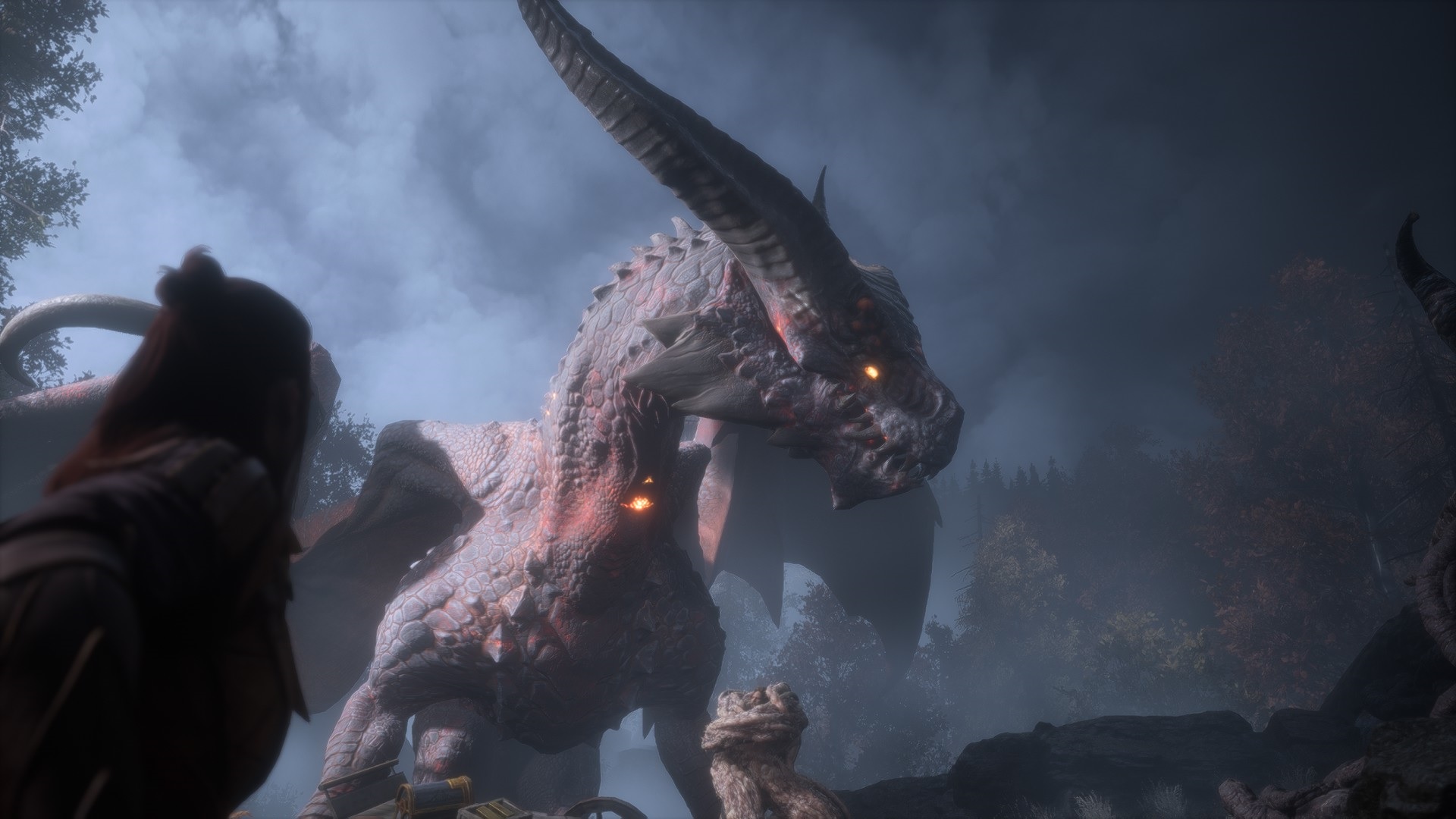
I land three headshots in a row, crippling the Venatori mage that's right in front of me. I backflip to get away from the fireball, but I'm not fast enough, being set aflame, my already-low health burning away. Calling on my necromancer friend Emmrich to heal me, I have my scout Harding land a heavy blow, finishing the mage off and winning the battle.
So go the adventures of Rook, latest in a long line of characters forced or fated to save Thedas, the setting for BioWare's Dragon Age franchise. Dragon Age: The Veilguard marks the fourth entry in this series, and its first new game since 2014's Dragon Age: Inquisition, which launched just shy of a decade ago at the time I'm writing this.
Dragon Age is a franchise that's close to my heart, and has been ever since I stayed up all night playing the first game, Dragon Age: Origins, falling in love with tales of Darkspawn, Grey Wardens, and a dark fantasy world that still found levity and humor in the characters that inhabited it. I've spent 50 hours playing Dragon Age: The Veilguard, and now that the credits have rolled, I'm ready to share my thoughts.
Dragon Age: The Veilguard streamlines a number of things, with breakneck pacing and an action-packed focus that makes this game in many ways closer tonally to BioWare's Mass Effect 2 than to other Dragon Age titles. The story (while intriguing) doesn't always give its earth-shattering reveals time to marinate or focus. At its heart, however, is a cast of characters among BioWare's finest, with bonds that carry this new journey to greatness.
What is Dragon Age: The Veilguard?
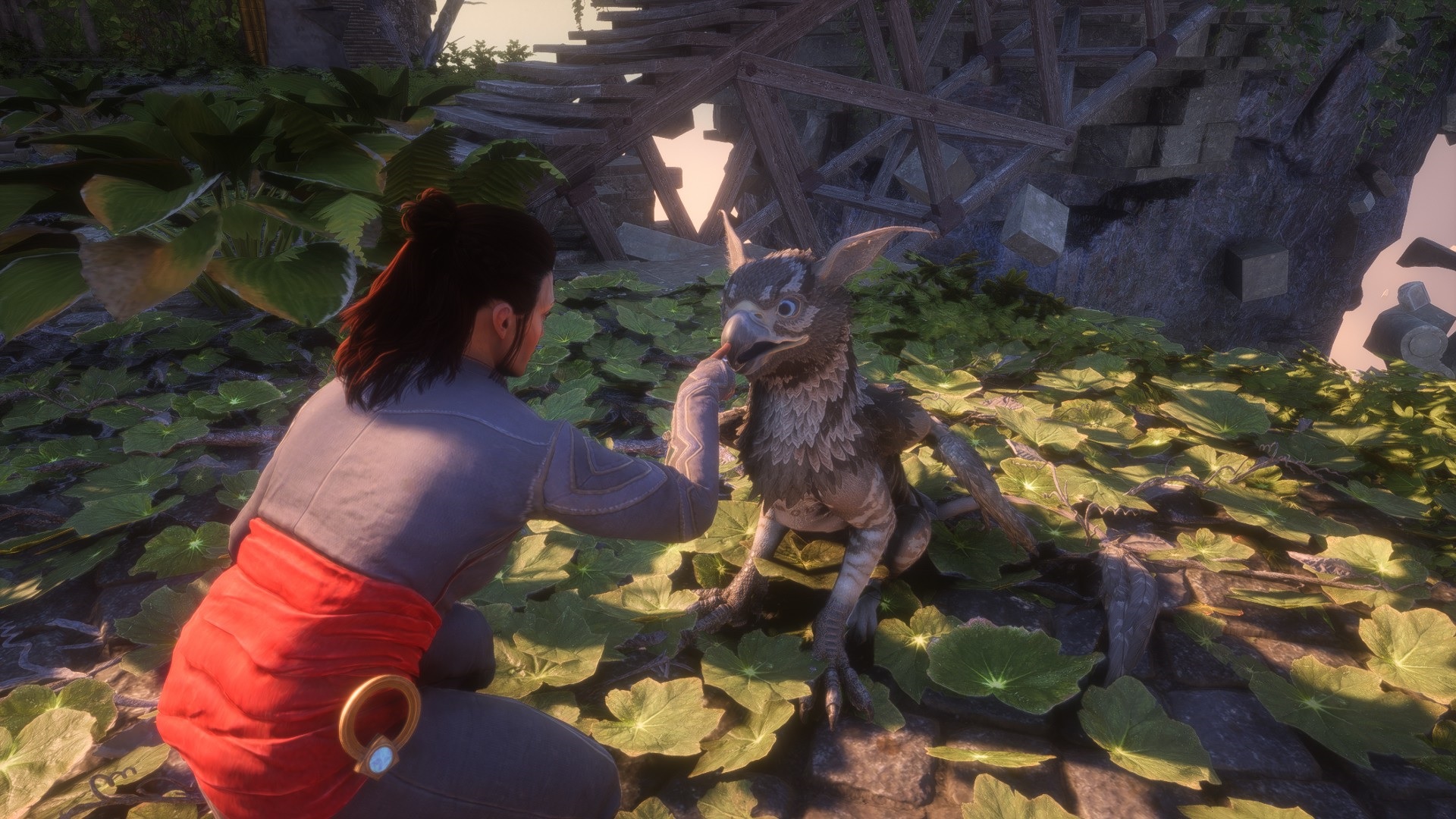
Dragon Age: The Veilguard is an action role-playing game (RPG) developed by BioWare and published by Electronic Arts.
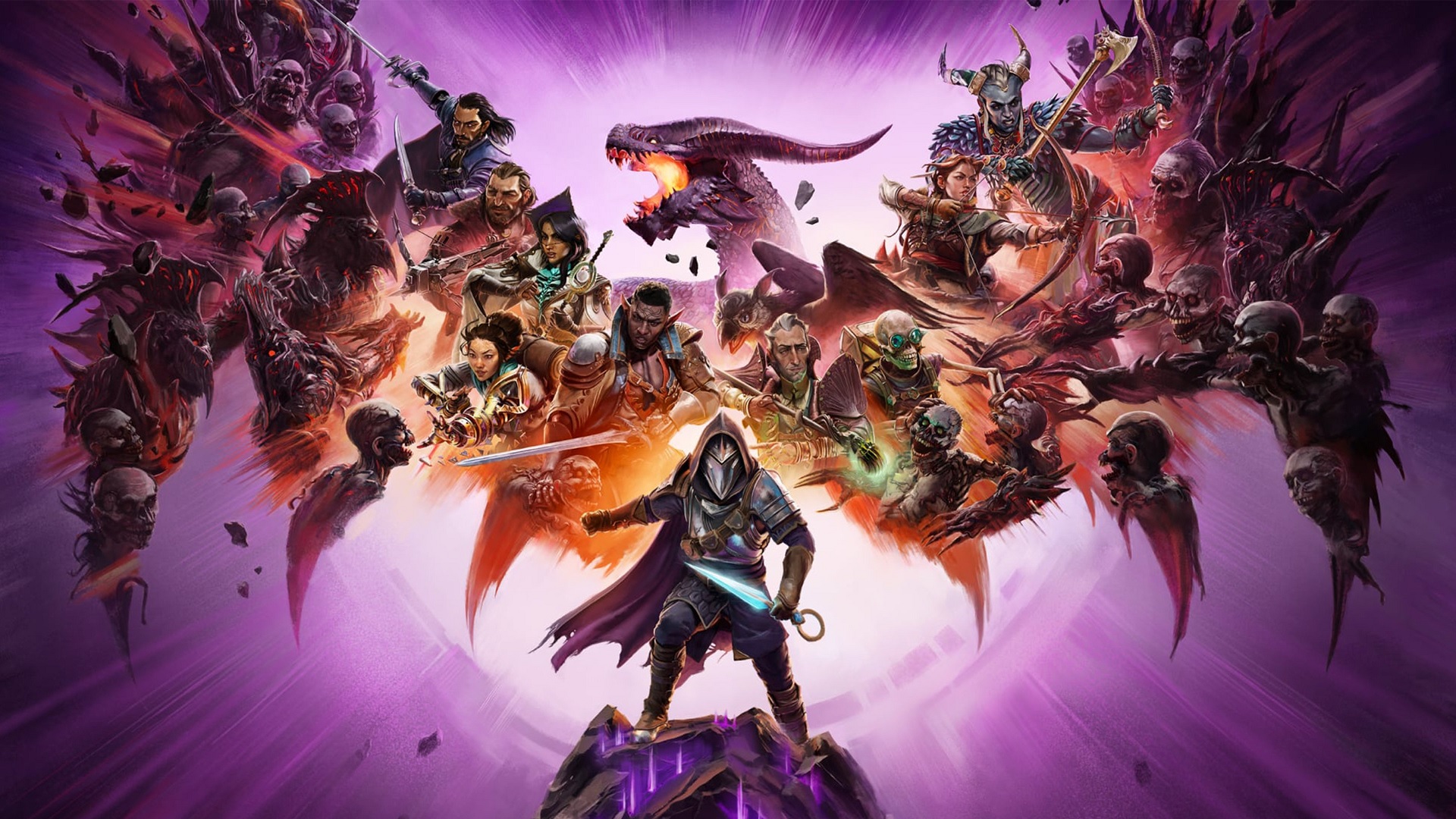
Price: $60 (PC), $70 (Xbox Series X|S, PlayStation 5) at MSRP
Developer: BioWare
Publisher: Electronic Arts
Genre: Action role-playing game
Install size: 89.05GB
Playtime: ~50 hours
Platforms: Windows PC, Xbox Series X|S and PlayStation 5
Reviewed on: Windows PC
Release date: Oct. 31, 2024
Xbox Game Pass: No
Crafting a player character named Rook — you can pick Rook's race, gender, class, and background affiliation — players build a team called The Veilguard to stop ancient elven deities from destroying the world. Acquiring new gear like improved weapons and armor, you grow stronger as you level up, evolving with additional skills that lend passive strength or abilities that can turn the tide of a battle.
Like in other BioWare games, you'll make decisions on who to befriend (and even possibly romance) while completing main missions and side quests across different regions, with your decisions affecting individuals and entire nations alike.
Altering the Dragon Age formula, The Veilguard leans in heavier than ever before on action, prioritizing moment-to-moment gameplay and reactive skill usage over tactical thinking and extensive preparation.
Dragon Age: The Veilguard review — Story and characters
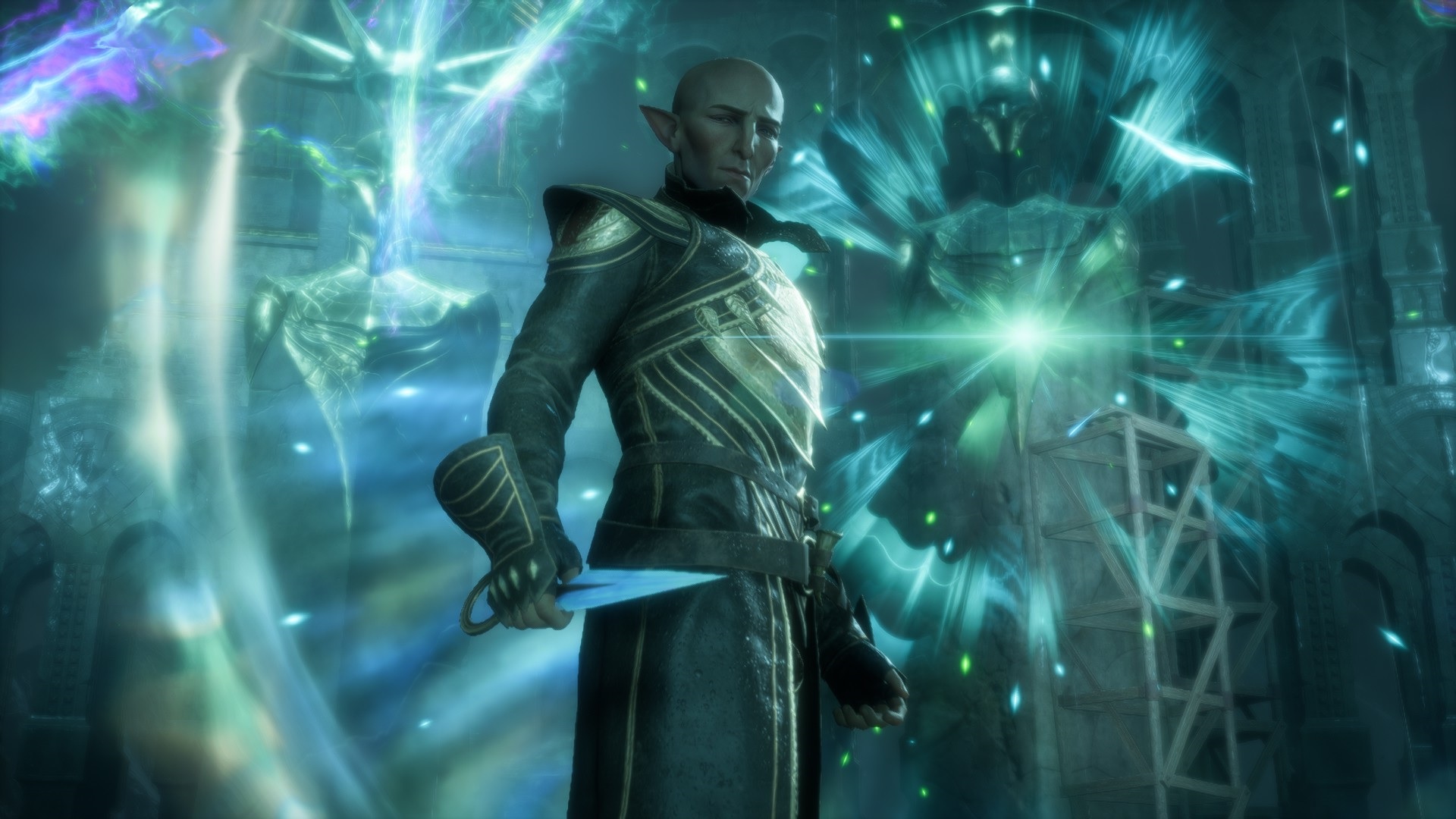
Coming 10 years after the events of Dragon Age: Inquisition (and eight years after its Trespasser DLC), The Veilguard juggles a number of story beats, functioning as both the most direct sequel ever in the series but also its most singularly distinct entry. Solas, Fen'Harel, The Dread Wolf — the elven god of trickery and deceit has many names, but only one goal, to tear down the Veil separating the world of Thedas from the Fade, a dreaming world of spirits and demons. Varric, one of Solas' former companions, is determined to keep him from destroying the world.
Enter Rook, hailing from some chunk of northern Thedas. While there's a range of role-playing customization options available, Rook has something of a set personality, operating as a blunt instrument trying as best they can to lead their team. Ultimately, Rook has more in common with Hawke than the Hero of Ferelden or the Inquisitor, feeling like a defined character as well as a player avatar.
Given Rook's role in opposing Solas — this game was once named Dragon Age: Dreadwolf, after the titular antagonist — the relationship between the two is fascinating to see unfold, and while I don't want to spoil anything in particular, it's one of the most rewarding relationship dynamics I've seen in a BioWare game. The decade-long wait for longtime fans paid off, and I found myself shedding a tear or two while experiencing the story unfold.
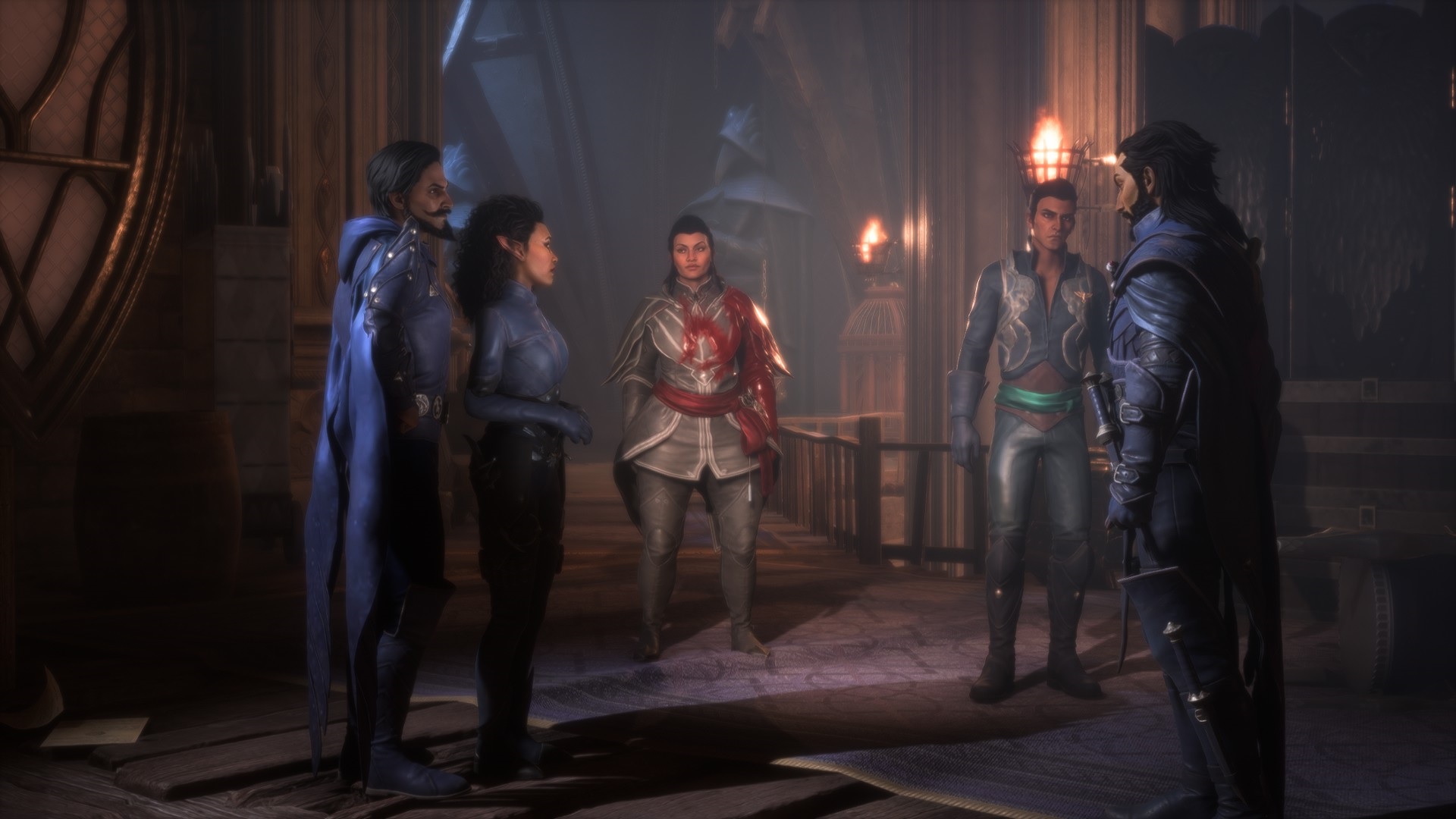
Arguably, even more important than Solas are the Veilguard, the companions that Rook gathers in their quest. Party members and their dynamics are a hallmark strength of BioWare storytelling, and The Veilguard delivers here in spades. I found myself getting attached to characters I initially rolled my eyes at, ecstatic to see how their stories would continue in friendship or in romance. All seven companions — Harding, Davrin, Emmrich, Taash, Bellara, Lucanis, and Neve — are an eclectic bunch, but they earn their place here.
Extending outside the core companions are the factions populating northern Thedas, with groups like the Antivan Crows, the Grey Wardens, Mourn Watchers, and many more to ally with.
While all these characters — friend, foe, and everyone in-between — are a treat to interact with, a number of the game's reveals are not given quite the same attention. The Veilguard isn't afraid of radically altering the status quo, throwing curveballs and questioning (or outright rejecting) long-held in-universe beliefs. I'm all for that, but many of them are glossed over or barely-addressed outside of offhand remarks, which is a shame because the ideas here are fascinating to grapple with.
I also wish the decisions from past games carried over here. Dragon Age has never been as interconnected as the original Mass Effect trilogy, but it was always cool seeing characters return in a new game after you'd saved their lives in the prior outing, or seeing a codex entry reflect one of your choices. What's here is handled well, but that touch is mostly missing, outside of a couple of key decisions from Dragon Age: Inquisition.
Dragon Age: The Veilguard review — Gameplay and features
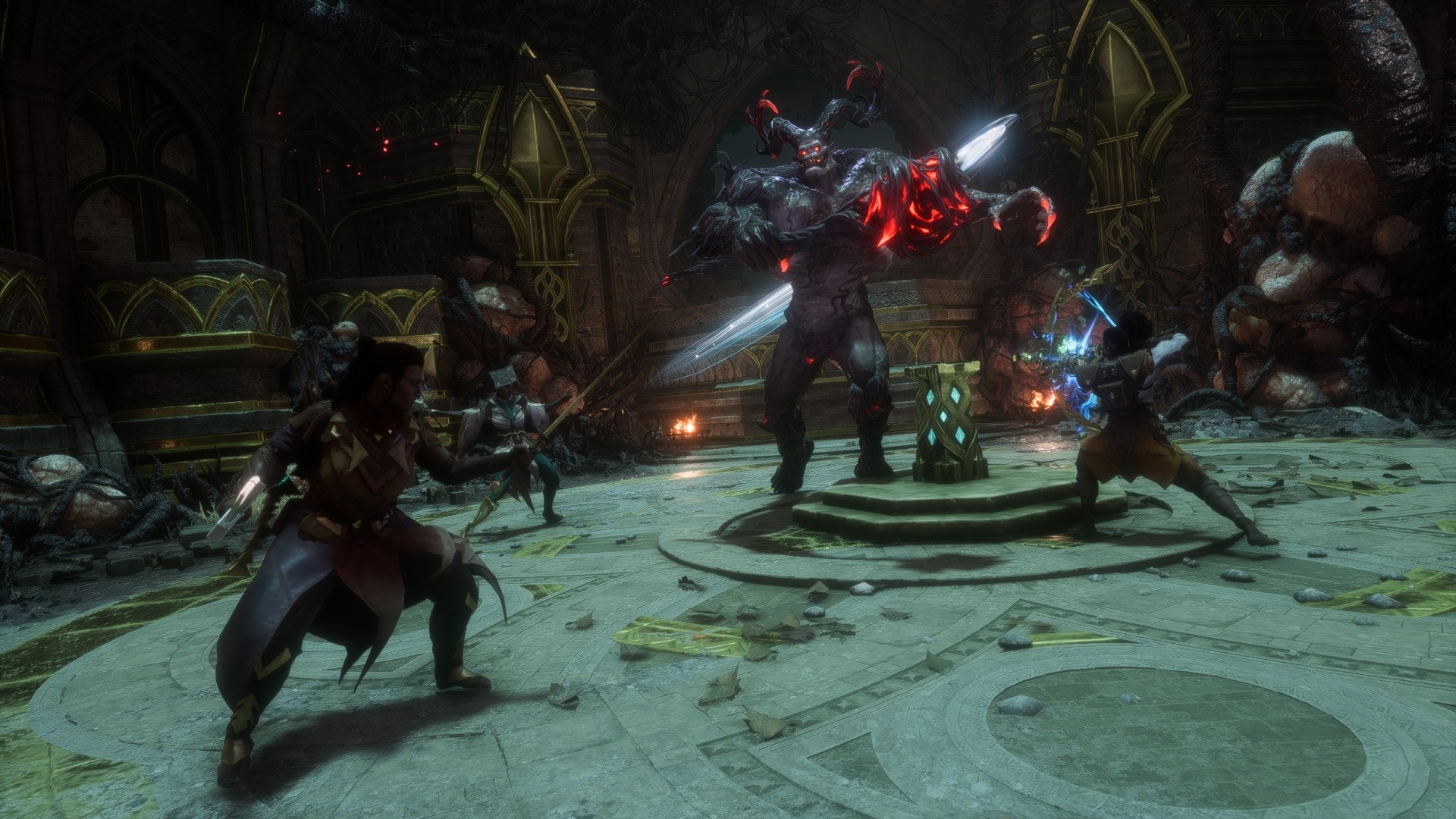
Dragon Age 2 and Dragon Age: Inquisition both inched the franchise away from the CRPG-esque roots of Dragon Age: Origins. Perhaps reflecting the decade-long wait between games, Dragon Age: The Veilguard does not inch, but instead takes a flying leap into full action-RPG territory.
That's not at all a bad thing, as playing as a Rogue has never felt this fun and responsive. Instead of awkwardly shuffling into position, my Rook zips across the battlefield, dodging and weaving, turning enemies into pincushions with a bow and arrow from a distance before closing in with poisoned blades. It's not tolerable or okay, it feels downright great to play. The Mass Effect influence here is strong, and it works well.
Like in prior games, you'll level up after getting enough experience points, earning skill points that can be used to expand Rook's repertoire. It's also how you unlock a particular specialization, making it feel natural as you literally expand your skills in a certain direction. My Rook ended up with a Saboteur specialization, unleashing enhanced explosive traps.
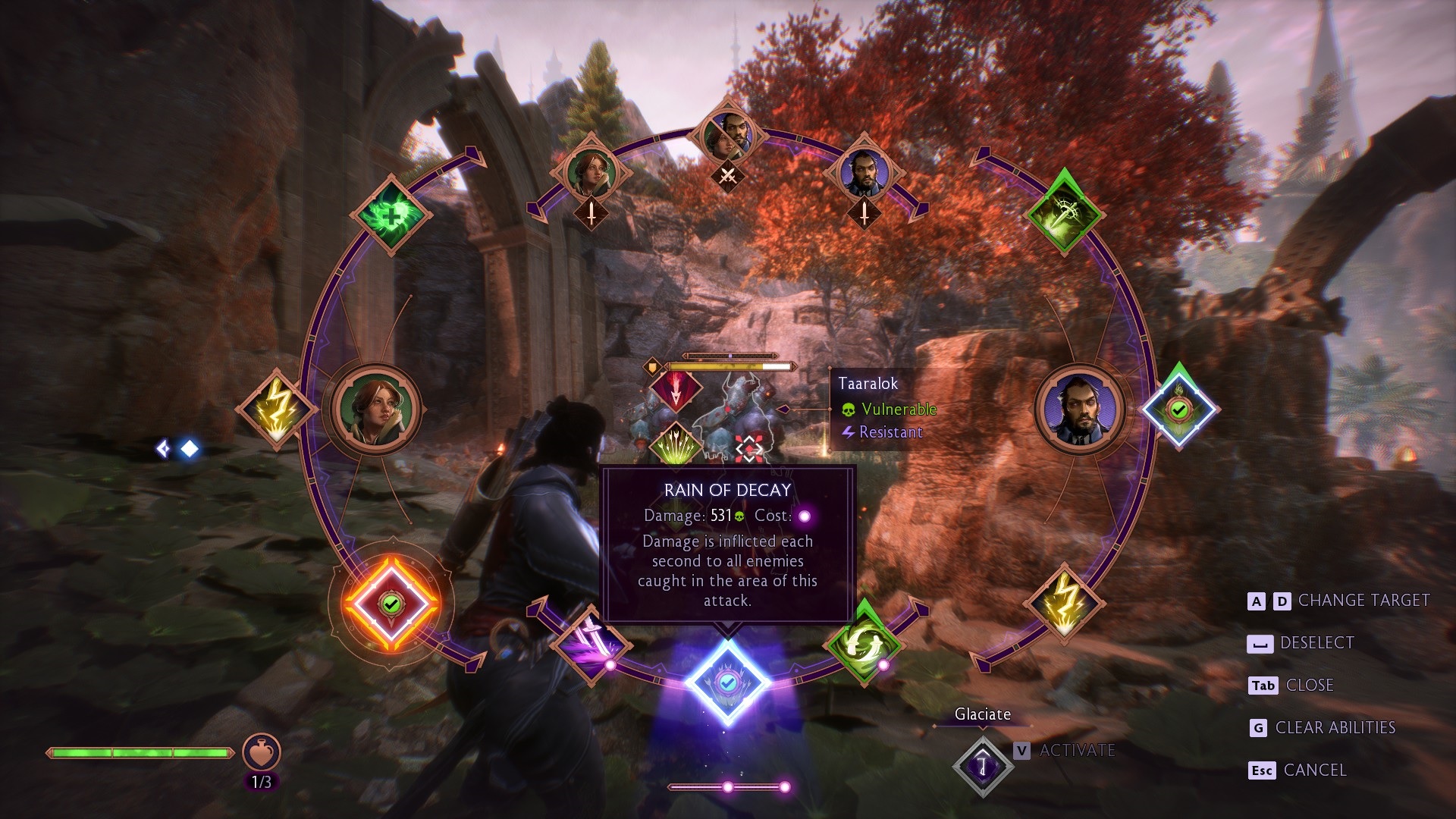
The continued influence from Mass Effect does rear its head in one annoying way, however, as you're now restricted to only two companions at a time in your party, issuing orders instead of being able to control them directly. In addition to a noticeable reduction in banter, it means you've got fewer options in particularly brutal fights. My adventures in other Dragon Age games are filled with desperate struggles where only one party member remained standing against a tough boss. With a battle over the moment Rook falls (and is unable to be revived) that's not an option here, and the experience is poorer for it.
General exploration and combat takes place over tight zones, with mostly-linear missions that have little space for exploration. I do wish these areas were larger, with more room to venture and wander, but it does neatly avoid the open-zone fatigue of Dragon Age: Inquisition, which often slowed the game's pace to a crawl.
Dragon Age: The Veilguard review — Visuals and audio
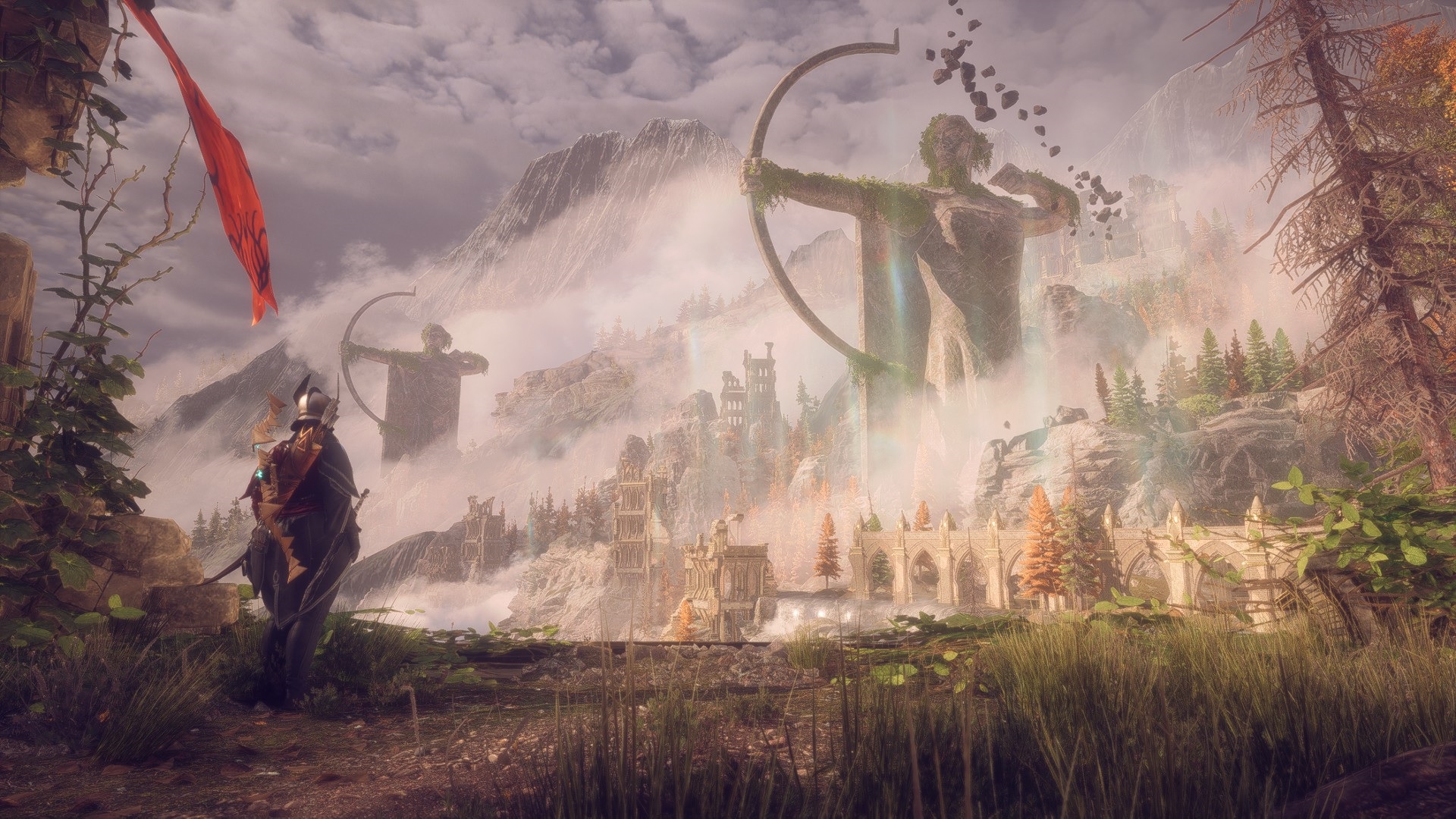
Continuing with the themes of constant change, every Dragon Age game has featured a markedly different art direction than its predecessor, and The Veilguard isn't stopping the trend now. Eschewing a hyperrealistic visual tone, The Veilguard instead opts for something more ethereal at first glance. Dark, towering spires and lush coastlines are awash in color, giving the game an almost painted aesthetic.
It's quite beautiful to look at, and is downright mesmerizing at times, given the wide range of locations The Veilguard visits. The nations of Antiva, Rivain, and Tevinter, long-mentioned in the stories of Dragon Age, are finally seen in a game here, and their presentation delivers in spades. The ray-traced reflections BioWare has implemented work wonders here, mirroring a thousand streetlights and magical wonders. It's not all beautiful high fantasy, though, and there's plenty of grime and darkness to go around. At multiple key points, BioWare dips back into its dark fantasy origins. The dry, haunted crypts of Nevarran tombs are as eerie as they are awing, while Blighted regions ooze with blood and puss.
While the character designs aren't the most detailed I've ever seen, art direction once again shines over raw fidelity, with tons of personality and beauty across your companions and the factions you interact with. Particular praise must be levied at the hair physics, which are a downright generational leap over anything in prior BioWare games. I've enjoyed every Dragon Age and Mass Effect game before this, but they all shared a similar, shameful lack of manes that's been heartily corrected here.
The one real exception is the Darkspawn. These once-horrifying foes have suffered with every entry in the franchise, being finally reduced here into uninteresting, goopy cannon fodder. There is a story explanation for the visual disparity here, but it's not enough to justify how thoroughly tiresome their new look is.
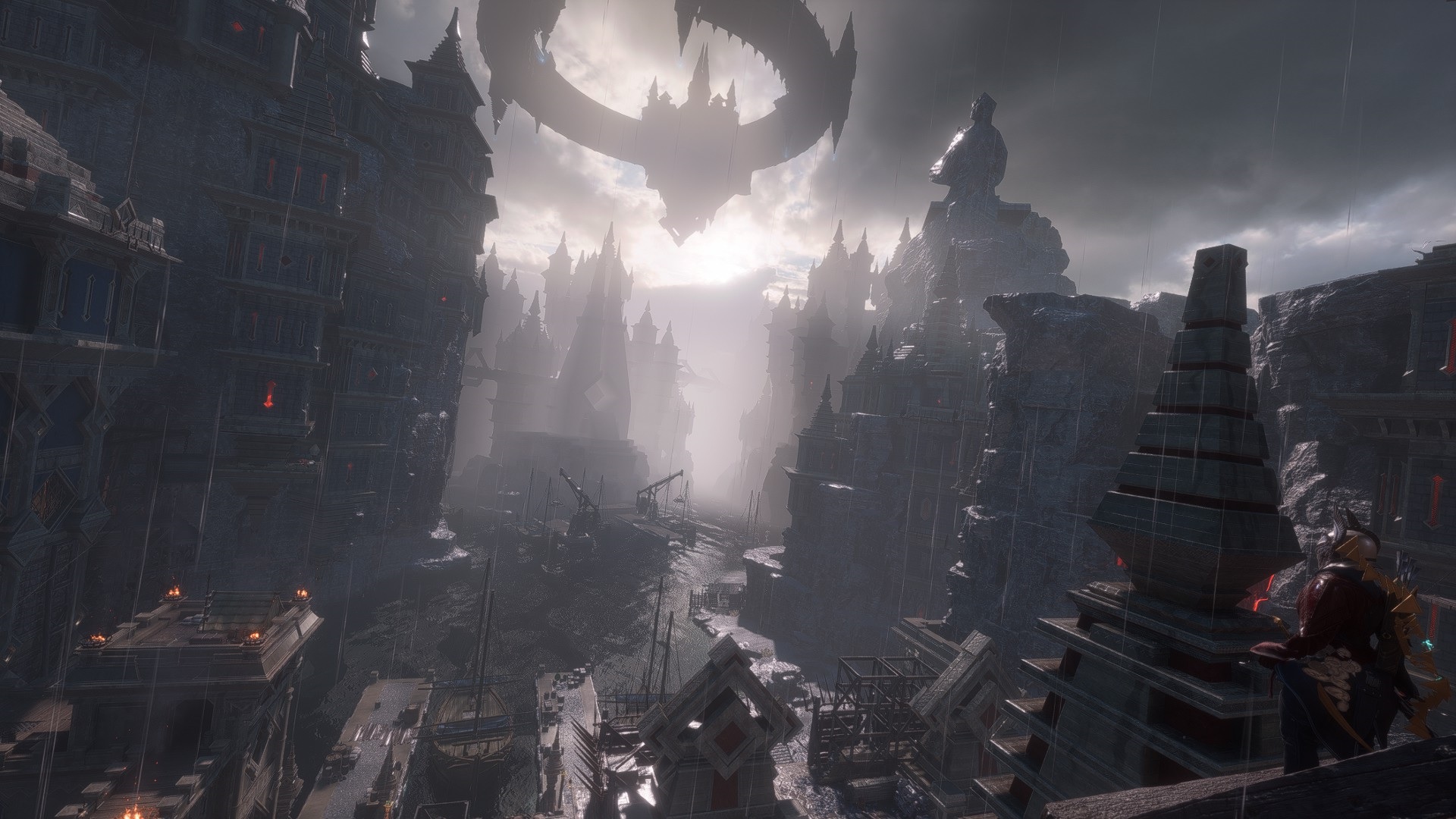
Running on my gaming PC with an RTX 3070 and an NVMe SSD, I was able to get Dragon Age: The Veilguard going at mostly maxed-out settings while maintaining 60 frames-per-second, with a small handful of features tweaked or disabled to avoid VRAM issues and stuttering. This setup worked for most of the game, though I noted a couple of larger areas in Arlathan forest seemed to be more demanding, with dynamic resolution visibly kicking in but still not being enough to avoid dropping frames.
Solid audio design work complements the game's visuals, with fantastic feedback as blades ring and spells fly. I particularly love the shattering glass sound associated with parrying a deadly blow, a noise that turns an impact of otherwise-imminent death into a second wind for a fight.
Dragon Age has a strong musical legacy, so I'm relieved to say The Veilguard also features a great soundtrack, with a rousing main theme co-composed by Hans Zimmer and Lorne Balfe that kicks in across pivotal moments of the game. There's a strength but more importantly an urgency in this score that suits the game's high stakes. It's different, lending a unique tone to The Veilguard that helps set it apart from the grander, more epic scale that Trevor Morris lent to Dragon Age: Inquisition, which itself stands apart from the haunting wails that Inon Zur composed for Dragon Age: Origins and Dragon Age 2.
Dragon Age: The Veilguard review — Accessibility and approachability
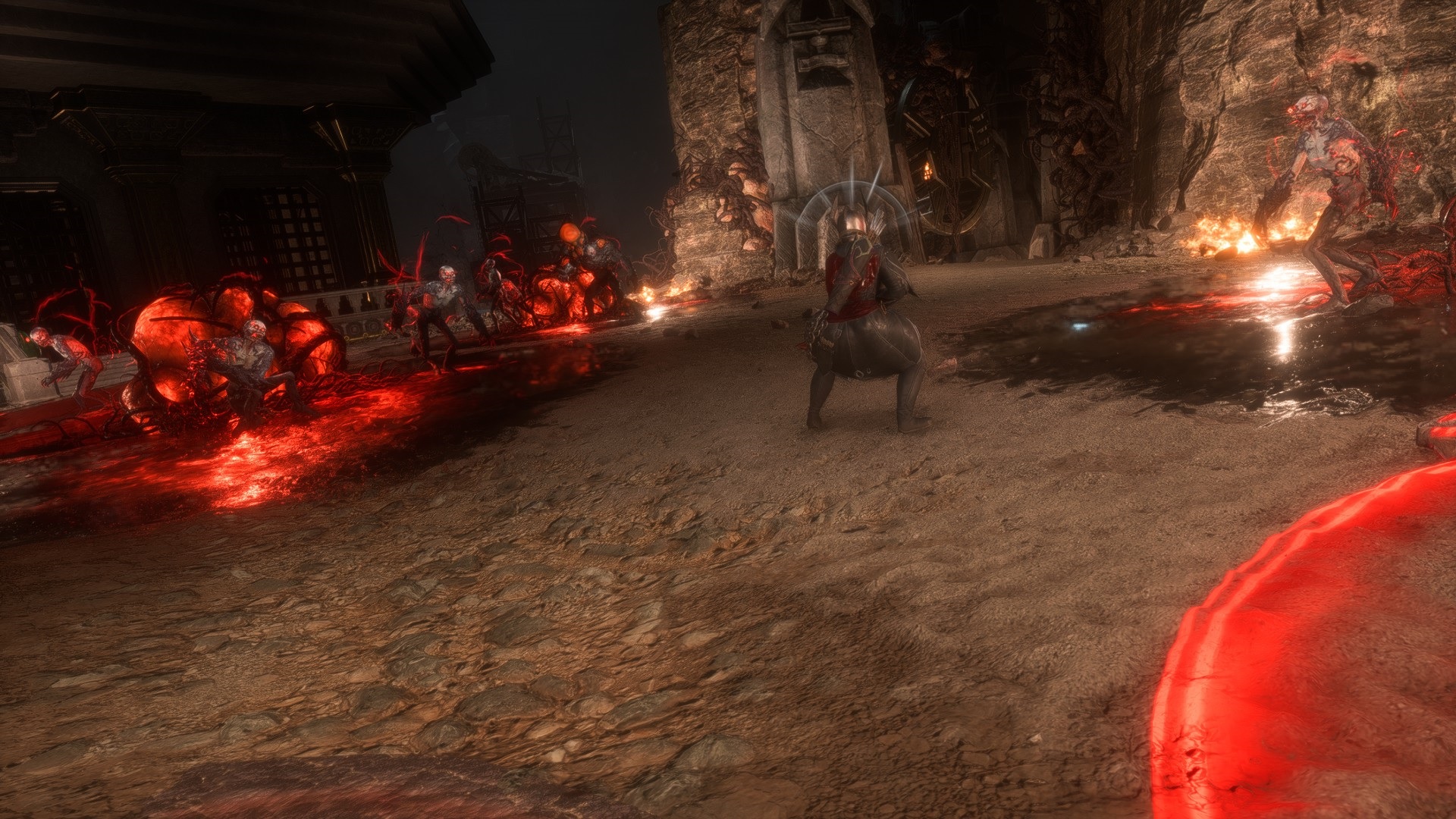
Like many other big games in recent years, Dragon Age: The Veilguard features a full suite of accessibility options. From font sizes and colorblindness settings to screen shake and a persistent dot, there are plenty of features that players can use to avoid motion sickness or suit their particular needs. This extends to the difficulty options, which can be adjusted at a granular level, letting players alter enemy aggression and combat timing to get things just right for their skill level or desired combat intensity.
As for the world's approachability, Dragon Age: The Veilguard does its best to set newcomers up, explaining key characters and concepts, while the in-game codex can be consulted for further information. Ultimately, though, this is the conclusion to an arc that began with Dragon Age: Inquisition, and a lot of the ideas simply aren't going to hit as hard for someone that isn't steeped in this world. Newcomers can absolutely have a fun experience, but I highly recommend being familiar with the world of Dragon Age before playing The Veilguard.
Dragon Age: The Veilguard review — Final thoughts
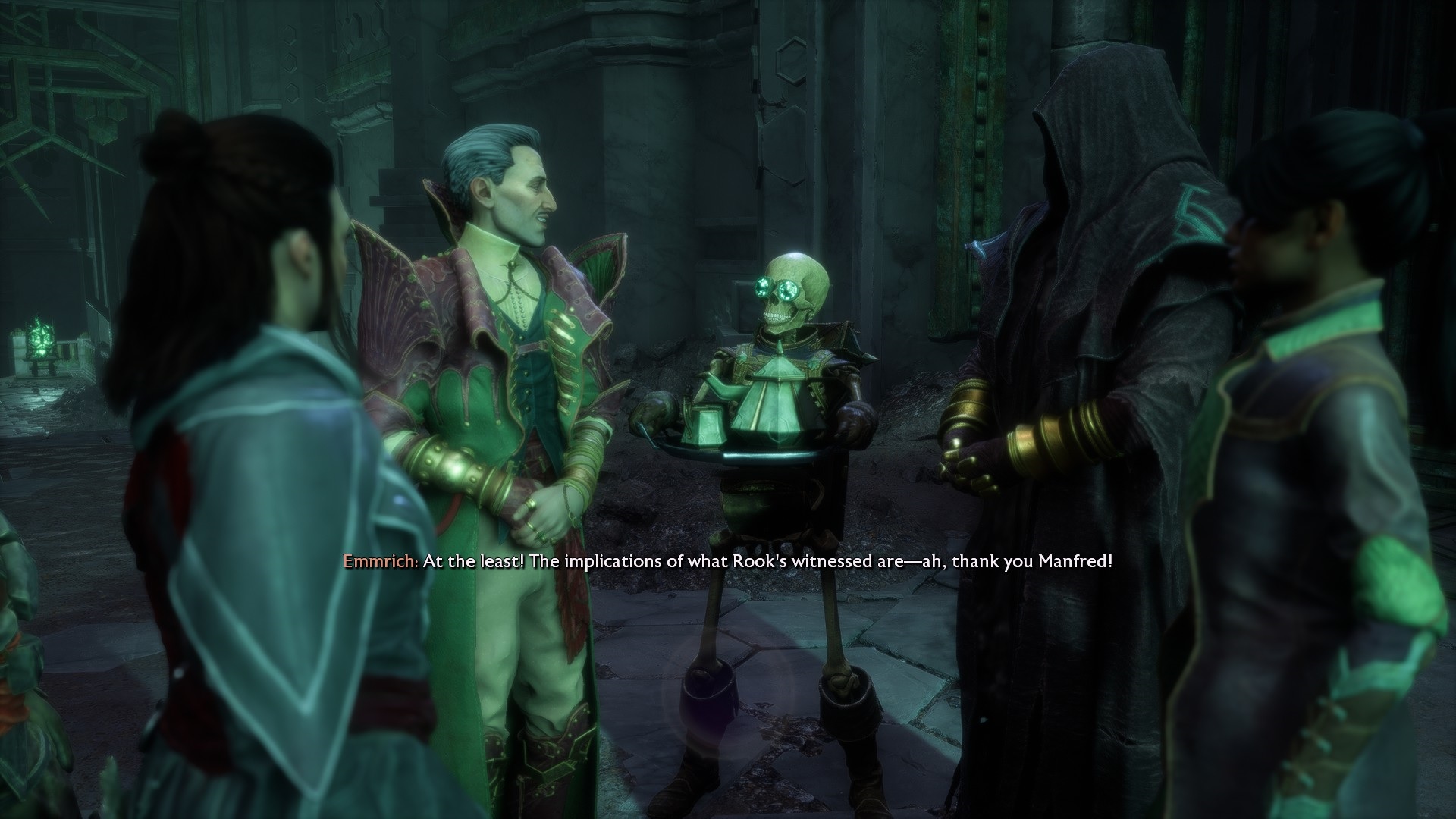
Dragon Age is fascinating, a truly unique franchise that sows debate with every appearance. Each entry has evolved and changed the formula, for better or worse. Coming a decade after its predecessor, that constant change never been more evident than here with The Veilguard.
The combat is wildly different and the tone varies, but the characters here are the same vital, meaningful core that BioWare is known to deliver. While far removed in many ways from the fantasy franchise I grew up loving, Dragon Age: The Veilguard takes its place by prior adventures in Thedas with pride. Like the Hero of Ferelden, Hawke, and the Inquisitor before them, Rook shows that Dragon Age isn't out of tricks just yet.
Some story reveals aren't expounded on nearly enough for my taste, and I certainly wish we had more time to explore some regions of Thedas that we're finally getting to see in a game. I'll forever mourn no longer directly controlling my companions. When all is said and done though, every prior Dragon Age game has managed to make me feel something, to grow attached to characters, cheering for their victories and mourning their passing. By that ultimate personal metric, Dragon Age: The Veilguard is a success.
Dragon Age: The Veilguard launches on Oct. 31, 2024 across Xbox Series X|S, Windows PC (Steam, EA App, and Epic Games Store), and PlayStation 5.







